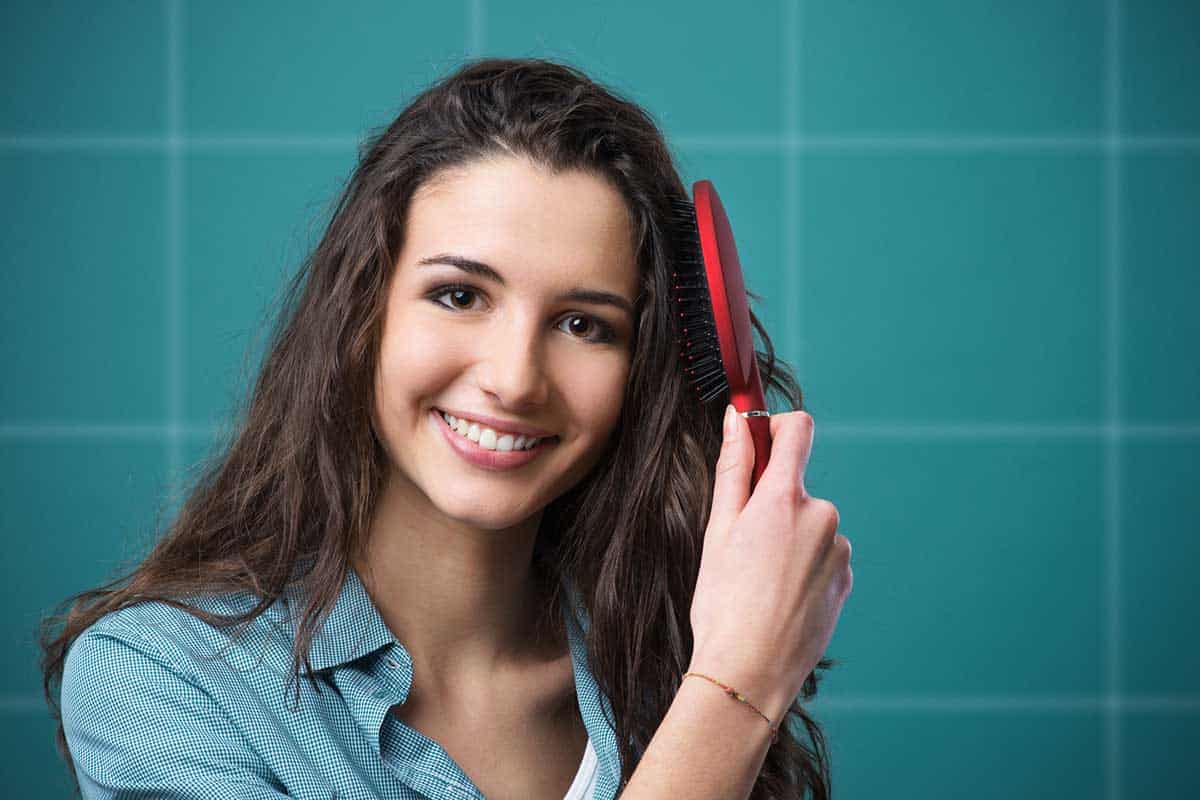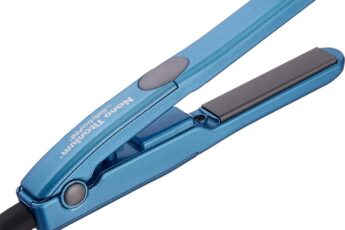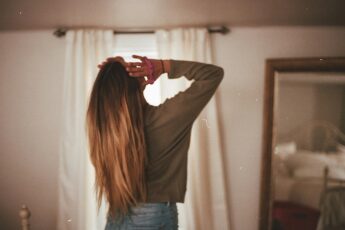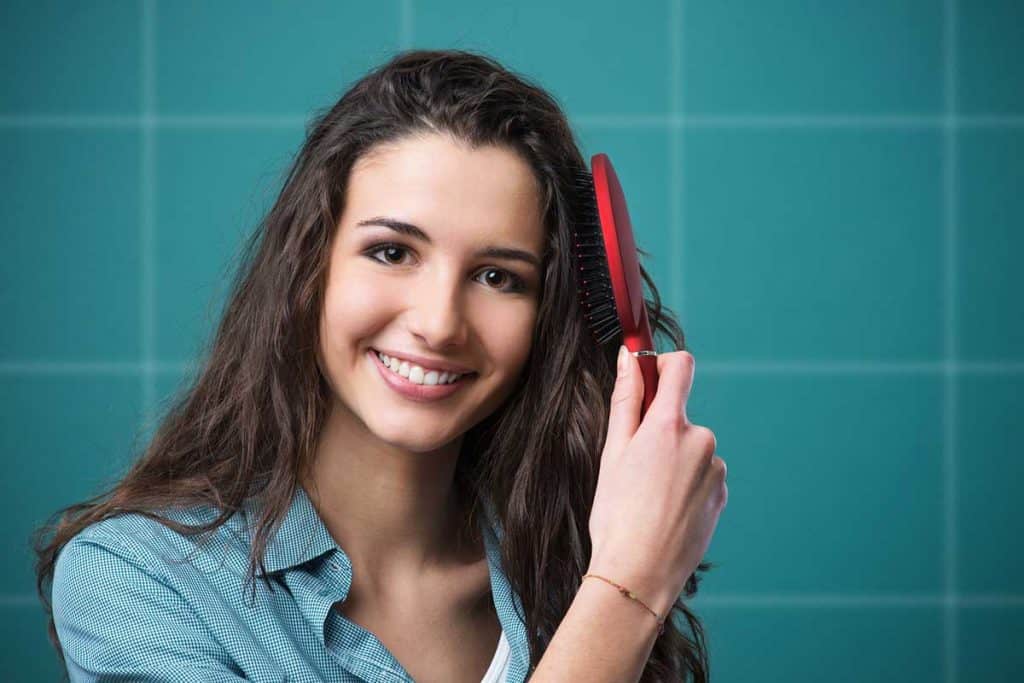
Should you brush your hair everyday? If you’ve reached a pandemic level of laziness and you’re now overthinking your entire hair routine, this is probably the first question on your mind. Is it necessary to brush your mane every single day, even if you’re not leaving the house?
We’re sorry to say that brushing should be a regular part of your daily routine. In fact, in this article, we’ll talk in-depth about the benefits of hair brushing, how to do it, and how often to practice it. Brushing is essential for good hair health; therefore, you shouldn’t skip on it because it only takes seconds.
If you’re eager to find out why the hair brush should be your go-to hair tool every single day, keep reading.
Table of Contents
How Often Should You Brush Your Hair?
Should you brush your hair everyday? Is that a good idea? Yes, it absolutely is!
According to experts, you should practice brushing twice a day, once in the morning and once in the evening. Including this routine twice means that you’ll manage to distribute the oils properly, prevent a greasy scalp, achieve shiny hair, and get rid of loose hair strands.
Let’s go over how often you should brush hair of each type:
Straight
The brushing frequency we mentioned above is mostly recommended for people with straight hair. So, if you belong to this group, you can feel free to grab your brush twice a day, once in the morning and again in the evening. Then, when you notice that your hair got tangled during the day, you can brush it again—just be very gentle, start from the tips, and work your way up.
Wavy
Wavy-haired people have a texture that’s somewhere between straight and curly. Frequent brushing can damage their beautiful waves, so they should stick to detangling it with their fingers and brushing it after washing, but while it’s still damp. The most you should brush wavy hair is once a day; however, ensure that you find the right brush type and use a gentle approach.
Curly
Curly and coily hair types don’t require as frequent brushing as straight hair. Therefore, the basic care rule for those blessed with luscious curls is to detangle after every shampooing session with their fingers and never brush their hair when it’s dry. So, in other words, it’s recommended that you brush curly hair once or twice per week, or after shampooing it.
Fine
Fine hair tends to tangle more easily than thick hair; however, most people with fine hair are afraid to brush it and cause breakage. Combing and brushing this hair type twice a day is completely fine, though, as long as you’re gentle and use the appropriate brush. Brushing will massage the scalp and stimulate blood flow and growth, which is welcomed for fine hair types.
Thick
Thick hair is easy to handle when it comes to brushing. Just follow the regular pattern of once in the morning and again in the evening, and feel free to add another brushing session during the day if you notice tangles, or go through your hair with your fingers.
Dry
Just like in most cases, there are exceptions to the rule. For example, people with dry hair can brush more than two times a day to stimulate blood flow and increase the production of natural oils. Also, it’s much easier for your hair to tangle when it’s long, so it might need a quick pick-me-up during the day.
Oily
A common misconception is that people with oily scalps should avoid brushing their hair too often. But in reality, they should practice the same frequency of brushing as people who don’t have oily hair because the brush can help redistribute the oils from the scalp and make it appear less greasy. Twice a day should be enough if you notice that your hair is greasy and straight.
Benefits of Brushing Your Hair
Is brushing your hair good for it? Yes, your hair can benefit a lot from brushing, and we have a list of benefits to convince you. The purpose of hair brushing isn’t only detangling and making it look good!
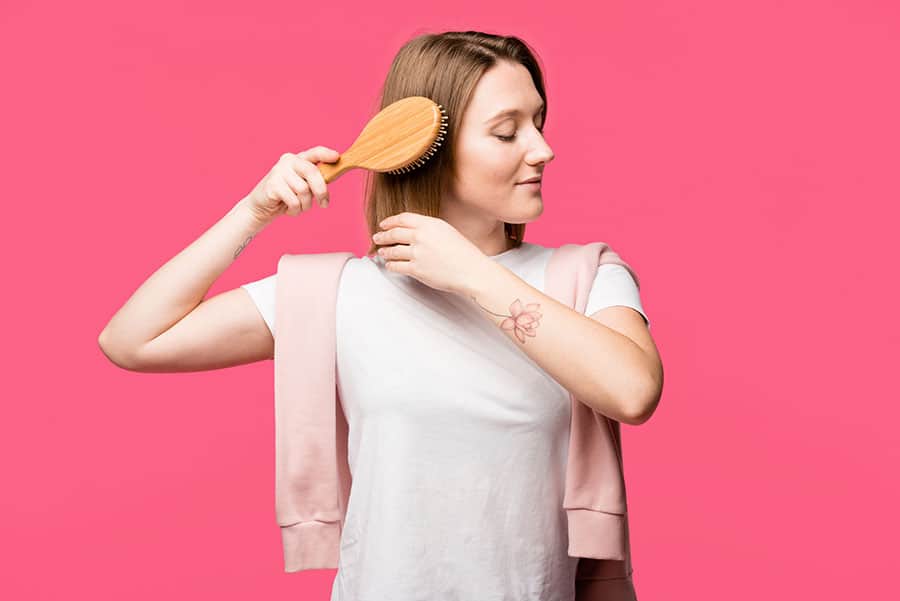
The reasons we talk about below are health-related and show how important it is for you to brush your hairdo.
1. Stimulate Hair Growth
When you brush your hair, you apply gentle pressure to the scalp, which serves as a massage. What you probably already know is that massages boost blood flow. In other words, when you regularly brush it, you massage your scalp and improve circulation.
This will ensure that the hair follicles are healthy and that your hair grows faster. Of course, you shouldn’t expect your hair to grow overnight just because you’re brushing it and massaging your scalp; however, it will have a positive impact.
Try including circular movements when you apply the brush to your scalp. You might find it strange at first, but it will soon become a habit.
Another great tip to improve circulation and stimulate hair growth is flipping your hair upside down. Brushing it upside down can also re-distribute the hair oils, delivering a shiny finish. In the following paragraph, you’ll find out all about it.
2. Hair Shine
Have you heard of the sebaceous glands located in the hair follicles? Well, these glands produce oils that make your hair shiny and lubricate the scalp. Without the natural oils, your hair will look dull.
Since you don’t want that to happen, brushing it is your best bet. When you apply the brush and move it from the roots to the tips, you spread the oils through the entire surface of the hair, making it look shiny and fresh.
What’s even more critical is that brushing prevents your scalp from getting too oily. As we mentioned, when you brush, you spread the oils from the roots to other parts, reducing the oil levels on the scalp.
So contrary to popular belief, brushing your mane won’t make it greasier. Instead, it will make your hair less greasy and will make it look healthier.
3. Remove Hair
There’s no need for loose hair to stay on your head. Losing between 50 and 100 hairs each day is completely normal, so these strands will eventually end up on your floor, bathroom sink, your tub, and all over the house.
While brushing your hair, a part of those loose strands will get on the brush instead of the floor. So by brushing your hair, you’re essentially getting rid of loose hair that doesn’t have to be there anymore.
How to Brush Your Hair
Now that we got the question “Is brushing your hair good for its health?” out of the way, let’s see how you should adequately brush it. The technique and brush you use are fundamental and can have a significant influence on hair health.
Wet
Wet hair is the most fragile and most susceptible to damage. All you have to do while it’s wet is go over it with your fingers or a wide-tooth comb to take care of tangles.
The next thing to do is wait for 10 to 15 minutes and only brush damp hair. This will significantly reduce damage and help you achieve a healthy mane.
Start from the tips and work your way up using small strokes. Each time you encounter a tangle, be gentle and take time to detangle it.
Dry
Dry hair gets messy too and requires brushing. Tangles and knots can lead to breakage, so it’s essential that you know the proper technique before you grab the brush.
When your hair is dry, there is no need to start at the tips. In this case, it’s okay to start somewhere in the middle of the length, then work your way down. If there are any knots, work on them slowly until they’re all gone.
You can move up and continue brushing down when you have gotten rid of all the tangles in the mid-section. Repeat these steps until you’re done with the entire length.
Curly
Curly hair might not require as frequent brushing as straight hair, but it does require frequent detangling. Before washing your ‘do, grab a wide-tooth comb or use your fingers to go over it and detangle as much as you can. You have to be very gentle to prevent damage.
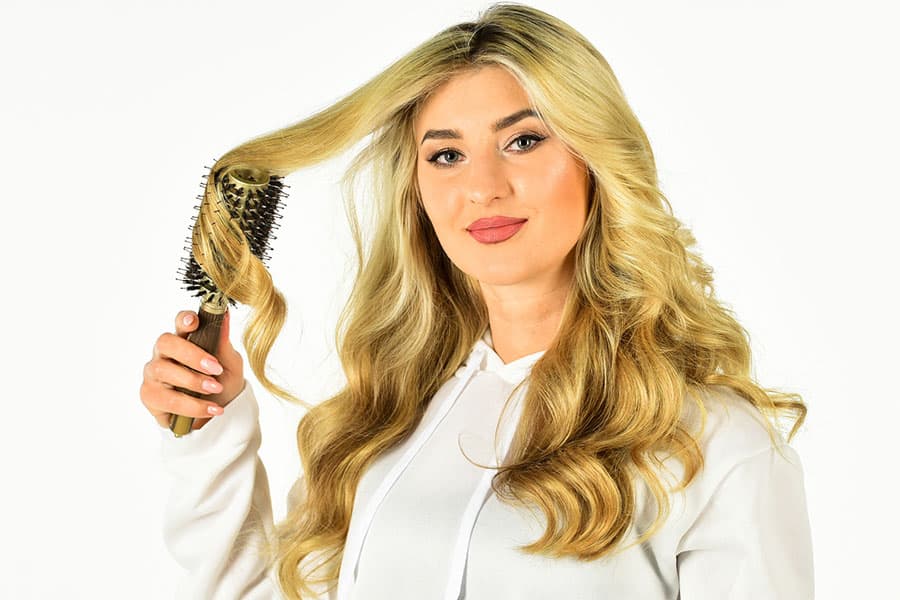
Another idea is to shampoo it, wash it, apply conditioner, then go over it with a wide-tooth comb. Once the hair is damp, you can use a special brush for curly hair to give it a quick brushing session. In general, brushes that don’t have bobbles are the best because they won’t pull on knots.
FAQs
What happens if you don’t brush your hair?
Not brushing can lead to a range of problems that can make your hair appear unhealthy. First, you’ll see plenty of hair in your drain after showering. Eventually, you might even end up clogging the drain.
Next, be prepared for a messy hairdo. Without brushing, your hair will have plenty of knots, tangles, and kinks. Again, this won’t be a neat look unless you’re going for extra volume and bedhead hair.
When you avoid brushing, your scalp will get greasier. Since you’re not helping natural oil distribution with a brush, you’ll have to wash your hair more often. You’ll also need to use more product to get rid of the tangles and kinks.
Finally, your hair won’t be as shiny as before. This is because your hands will be on your head constantly, but that’s not enough to spread the oils from the roots to the tips. Therefore, your hair will appear dull and unhealthy.
Does hair fall out if you don’t brush it?
Yes, hair does fall out even when you don’t brush it. When you brush it, most of the loose strands will end up on your comb or brush. If you don’t brush it, these strands will be all over your house and in your drain.
When some people experience hair loss, they’re under the impression that brushing your hair will prevent it from falling out. However, that’s not quite the case unless they’re using an improper brushing technique and they’re damaging the hair.
You can expect to lose between 50 and 100 hair strands every day, and they’ll keep falling regardless if you decide to brush your mane or not. This is an entirely normal process, and you should only start worrying if the number of loose hairs goes over 100.
Conclusion
Do you need to brush your hair everyday? If you have doubts about whether hair brushing is good and how often to do it, we hope we answered all your questions. Experts recommend that you practice brushing twice a day, once in the morning and once in the evening.
Hair brushing comes with many benefits, including a shinier hairdo, removal of loose hair strands, stimulation of blood flow, hair growth, and more. If you don’t brush it as recommended, you will end up with messy knots and tangles that later require a lot of effort to remove and can damage your hair.
1
